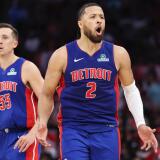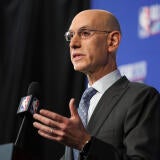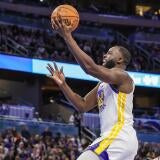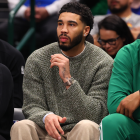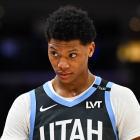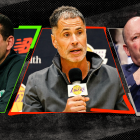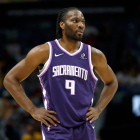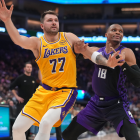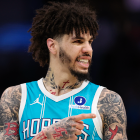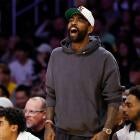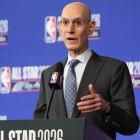Lakers' small ball, Rockets' bench units and most important lineups for Western Conference's top contenders
These are the lineups that will determine the Western Conference champion
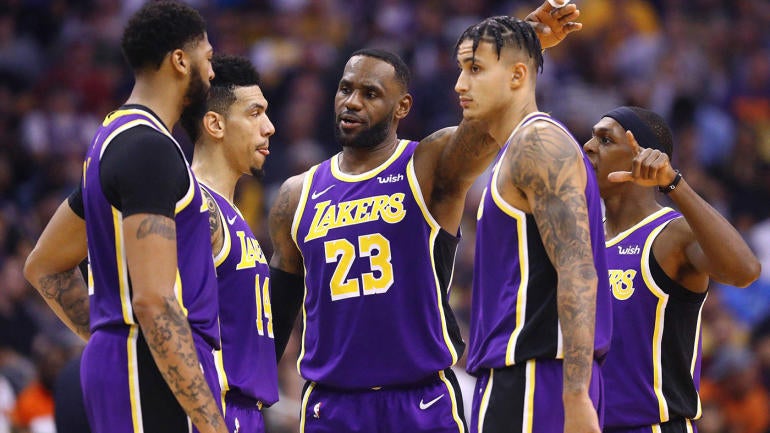
The idea of a basketball game is, in itself, something of a misnomer. Really, it is a series of microgames. Five players take the floor, share it for a few minutes, and then a new combination takes over. Over the course of 48 minutes, a team might use over a dozen different combinations, with the final score ultimately owed to what those groups did in the aggregate.
Some of those groups contribute very little. Others, quite a bit. And each team relies on different ones for different things. With the playoffs so heavily based on matchups, the choices that go into building those five-man groups are absolutely critical. The wrong player in the wrong spot can swing a series.
So let's take a look at the lineups that will make or break potential championship runs for each contender in the Western Conference. While some teams need more out of their star-driven lineups, others need a boost from unheralded bench groups. Every team in the West has at least one major lineup-driven question to answer, so we'll start with the team standing atop the conference.
Los Angeles Lakers
Most important lineup: LeBron James, Kentavious Caldwell-Pope, Danny Green, Kyle Kuzma, Anthony Davis
The Lakers could list dozens of reasons for playing a true center nearly all of the time, but the simplest is that it works. At 41-12, wholesale changes just haven't been necessary. JaVale McGee and Dwight Howard have both exceeded expectations. Lineups featuring either haven't presented any glaring deficiencies. For the time being, the Lakers aren't going to bother fixing what isn't broken.
But a time is going to come in which playing two centers -- either Howard or McGee alongside Davis -- is not going to work. Potential series against the Clippers and Rockets come to mind. The best Clippers center is 6-8. The best Rockets center (Clint Capela) now plays for the Hawks. Neither of those series will be winnable with brute force alone. The Lakers are going to have to go small.
Fortunately, their preferred small-ball alignment has been sensational this season. The Lakers have outscored opponents by over 16 points per 100 possessions when Kuzma replaces Howard or McGee, per Cleaning the Glass, and that number rises to 17.5 with Green and Caldwell-Pope occupying the final two spots in the lineup. That fivesome strikes the ideal two-way balance for this roster. Kuzma is the only leaky cog defensively, but his size is helpful and his specific offensive talents mesh well with Green and Caldwell-Pope's shooting.
But as well as that group has played, it isn't without its flaws. Much of Kuzma's offensive utility relies on defenses treating him like a consistent shooter. He isn't one, and playoff-caliber game-planning is going to lead to that adjustment. The Lakers are already surprisingly vulnerable on the boards. They are ranked only ninth in rebound rate even with their two giants playing the majority of games, and Davis-at-center lineups have struggled on the glass. The entire ball-handling burden on that lineup still falls on James unless Kuzma can pick up his slack.
The Lakers have had the good fortune of treating their small-ball lineup like a secret weapon so far this season. They have been so dominant that they've been able to cherry-pick matchups and game situations to use it in. They won't be able to control the terms of engagement as easily in the playoffs. At some point or another, Davis is going to have to play 30 minutes at center in a Game 6 or 7. We've seen what such lineups can do in small samples, but if that tactic is going to win the Lakers a championship, there are still kinks that need to be worked out.
Denver Nuggets
Most important lineup: Monte Morris, Will Barton, Michael Porter Jr., Jerami Grant, Mason Plumlee
Nuggets coach Mike Malone tends to fall back on old-school substitution patterns. Eschewing the analytically-approved method of staggering his stars, Malone prefers to handcuff Nikola Jokic to Jamal Murray and handle substitutions in waves. Denver's starting lineup of Jokic, Murray, Gary Harris, Paul Millsap and Will Barton has played the second-most minutes of any five-man group in the NBA despite the players that comprise it missing 46 total games so far this season. Malone plays them together, and as a result, usually rests them together.
This was especially true in the 2019 playoffs. Murray played only 94 possessions without Jokic last season compared to nearly 900 with him. The Nuggets played 145 total possessions with both benched in those playoffs, and were decimated by over 36 points per 100 possessions. It's not an exaggeration to suggest overreliance on bench mobs cost Denver a trip to the Western Conference finals.
But such lineups are built into Malone's DNA as a coach, and if he goes back to them this time around, it puts his youngest rotation player in a very interesting position. Michael Porter Jr. projects to eventually become the sort of one-on-one scoring threat that can carry an offense without Jokic and Murray, but asking him to do so as a rookie is a dangerous bet for a contender to make. But Denver doesn't need its bench to win games. It just needs it not to lose them. Lineups featuring Porter without Jokic and Murray have largely played opponents to a draw so far this season, getting outscored by 0.6 points per 100 over the course of 588 possessions.
Practically every Murray-Jokic alignment posts championship-caliber numbers. Surviving the minutes they sit is going to be one of their keys to an extended playoff run. Malone will tinker with the group surrounding him, but the fundamental idea of Porter plus role players is likely going to be Denver's plan entering the playoffs.
Los Angeles Clippers
Most important lineup: Patrick Beverley, Lou Williams, Kawhi Leonard, Paul George, Montrezl Harrell
Last season's Clippers had the best clutch net rating in the NBA, blitzing opponents by over 17 points per 100 possessions late in close games. The Toronto Raptors weren't far behind in finishing fifth, and the Oklahoma City Thunder were at least above-average at 12th. This year's Clippers combined the best of all three ... and are somehow ranked only 13th. Their plus-3.1 clutch net rating has them nestled uncomfortably between the Sacramento Kings and New York Knicks.
There are a number of plausible explanations for this, and availability is the easiest. Most of their struggles have come on defense, where they are ranked 28th in clutch settings, and the notion of a unit with Leonard, George and Beverley playing so poorly on that end of the floor when all are healthy is unfathomable. Their fifth-ranked clutch offense looks great on paper, but falls apart upon closer examination. Kawhi, still dining off of his historic dagger against Philadelphia, has quietly shot only 37.5 percent from the field and 14.3 percent on 3-pointers in the clutch this season. Positive regression is coming, but those numbers are much closer to Leonard's norms than his incredible Raptors run would suggest. He's not Michael Jordan.
For all of the press Kawhi gets, the Clippers generate most of their clutch points off the same Lou Williams-Montrezl Harrell pick-and-roll that carried them a year ago. Williams and Leonard are scoring essentially evenly in the clutch, but Williams is shooting 46.5 percent from the field and 44.5 percent on 3s. Harrell is hitting over 70 percent of his clutch shots. None of this is meant to suggest that the Clippers should keep the ball out of Leonard's hands in big moments. Far from it. There is a healthier mix of the old Clippers and the new in there somewhere.
What's concerning is how unconcerned the Clippers appear to be with finding it. The three Clippers who led last season's feel-good story have played only 96 total possessions alongside the team's two new stars. Even when Beverley is removed from the equation, the number jumps only to 220. Replace Williams and Beverley with Ivica Zubac and the departed Moe Harkless and that total nearly triples.
All season long, the Clippers have hesitated to deploy their five best players together at the same time despite overwhelmingly positive results. In a limited sample, that lineup has outscored opponents by 24.3 points per 100 possessions. While the group is clearly more offensively-inclined on paper, it has allowed only 84 points per 100 so far this season, and the Williams-Harrell-Beverley trio held its own even without Leonard and George last season. With the pressure Williams and Harrell have proven to take off of Kawhi in late-game situations, it makes absolutely no sense that we haven't seen more of this group as a whole. That is bound to change when the load-management training wheels are removed in the playoffs, but the Clippers aren't getting this time back. How that group performs without the regular-season reps every other team is accumulating right now is anyone's guess.
Utah Jazz
Most important lineup: Donovan Mitchell, Joe Ingles, Bojan Bogdanovic, Royce O'Neal, Rudy Gobert
There is a reasonable argument to be made that the starting group Utah used for most of December and January is the single-best five-man lineup in all of basketball. It has played over 1,000 total possessions this season and ranks in the 99th percentile offensively and 95th defensively, per Cleaning the Glass. Ingles has been one of the NBA's best shooters since moving into the starting lineup. Bogdanovic isn't far behind. O'Neale has become one of the NBA's most underrated defenders. The quintet is neck-and-neck with Milwaukee's dominant opening five for the title of best starting lineup in the NBA, trailing by only 0.3 points per 100 possessions at the moment, but leading the Bucks by nearly 300 possessions in sample size.
And Mike Conley could still ruin everything. Utah is a relatively mediocre 15-11 in games he starts, but are an excellent 21-7 in games he doesn't. That's hardly a surprise. A starting point guard shooting below 40 percent from the field and averaging only 4.2 assists per game is rarely conducive to winning. At last blush, though, Conley remained a Jazz starter. While he sat out Utah's last two games before the All-Star Break, he started the previous four after an impressive 4-2 bench stint that should have been proof of his ideal role. Instead, the Jazz seem determined to reintegrate Conley back into the starting lineup.
Utah is currently ranked 25th in the NBA in bench points per game. The defense falls off of a cliff whenever Gobert sits. The Jazz could really use a veteran guard to stabilize both sides of its reserve units and potentially serve as occasional crunchtime reinforcements when another ball-handler is necessary. Conley is their best chance at finding such a player, but not if they continue to insist that he's the sort of must-start veteran they thought they were trading for last summer.
Houston Rockets
Most important lineup: Russell Westbrook, Austin Rivers, Eric Gordon, Danuel House, P.J. Tucker
The Rockets are fairly simple from a lineup perspective. Lineups that include James Harden tend to play fairly well. Lineups that don't tend not to. While the Rockets have seen significant improvement from the early-season disaster of Russell Westbrook's solo minutes, they have still been outscored as a whole during the minutes he has played without Harden.
The struggles that have made that possible will only be amplified in a playoff setting, but Houston has largely neutralized those weaknesses lately. Nobody is going to guard him from behind the arc in the postseason, but Westbrook has cut his 3-point attempts by more than half since the calendar turned over to 2020, trusting Houston's small-ball alignments to space the floor to such a degree that shooting himself is largely unnecessary. Westbrook is accepting the runway the Rockets have generated for him and almost exclusively attacking the basket.
That has remained true even in the minutes Harden has sat out, but it is undeniably more difficult without the barrage of doubles and traps he draws. Playoff defenses will be even more aggressive about sagging elsewhere. It's what makes Mike D'Antoni's lineup choices so important during the spring. Westbrook virtually has to play all of his minutes alongside Tucker because of what a true center would do to Houston's spacing. Questionable bench shooters like Thabo Sefolosha and Jeff Green are likely out as well.
Short of swapping in House for Harden and retaining the rest of the starting five, though, no fivesome Houston chooses is going to be devoid of weaknesses for defenses to test. Even a lineup like the one presented above would almost certainly feature defenses sagging off of Rivers. Houston's playoff runs often boil down to players making or missing open shots. That will likely be the case again this time around. Surround Westbrook with enough shooting and Houston can survive the minutes it plays without Harden. Fail to do so, and Harden's dominance will hardly matter.


